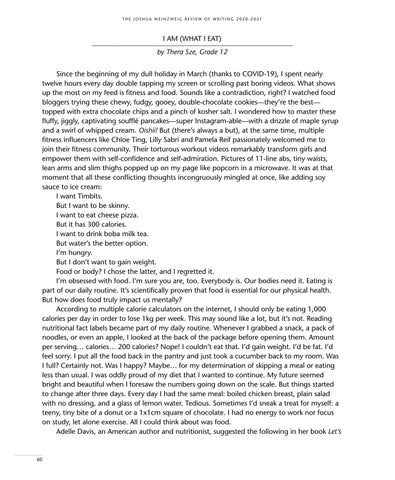THE JOSHUA WEINZWEIG REVIEW OF WRITING 2020-2021
I AM (WHAT I EAT) ____________________________________________________________ by Thera Sze, Grade 12 Since the beginning of my dull holiday in March (thanks to COVID-19), I spent nearly twelve hours every day double tapping my screen or scrolling past boring videos. What shows up the most on my feed is fitness and food. Sounds like a contradiction, right? I watched food bloggers trying these chewy, fudgy, gooey, double-chocolate cookies—they’re the best— topped with extra chocolate chips and a pinch of kosher salt. I wondered how to master these fluffy, jiggly, captivating soufflé pancakes—super Instagram-able—with a drizzle of maple syrup and a swirl of whipped cream. Oishii! But (there’s always a but), at the same time, multiple fitness influencers like Chloe Ting, Lilly Sabri and Pamela Reif passionately welcomed me to join their fitness community. Their torturous workout videos remarkably transform girls and empower them with self-confidence and self-admiration. Pictures of 11-line abs, tiny waists, lean arms and slim thighs popped up on my page like popcorn in a microwave. It was at that moment that all these conflicting thoughts incongruously mingled at once, like adding soy sauce to ice cream: I want Timbits. But I want to be skinny. I want to eat cheese pizza. But it has 300 calories. I want to drink boba milk tea. But water’s the better option. I’m hungry. But I don’t want to gain weight. Food or body? I chose the latter, and I regretted it. I’m obsessed with food. I’m sure you are, too. Everybody is. Our bodies need it. Eating is part of our daily routine. It’s scientifically proven that food is essential for our physical health. But how does food truly impact us mentally? According to multiple calorie calculators on the internet, I should only be eating 1,000 calories per day in order to lose 1kg per week. This may sound like a lot, but it’s not. Reading nutritional fact labels became part of my daily routine. Whenever I grabbed a snack, a pack of noodles, or even an apple, I looked at the back of the package before opening them. Amount per serving… calories… 200 calories? Nope! I couldn’t eat that. I’d gain weight. I’d be fat. I’d feel sorry. I put all the food back in the pantry and just took a cucumber back to my room. Was I full? Certainly not. Was I happy? Maybe… for my determination of skipping a meal or eating less than usual. I was oddly proud of my diet that I wanted to continue. My future seemed bright and beautiful when I foresaw the numbers going down on the scale. But things started to change after three days. Every day I had the same meal: boiled chicken breast, plain salad with no dressing, and a glass of lemon water. Tedious. Sometimes I’d sneak a treat for myself: a teeny, tiny bite of a donut or a 1x1cm square of chocolate. I had no energy to work nor focus on study, let alone exercise. All I could think about was food. Adelle Davis, an American author and nutritionist, suggested the following in her book Let’s
–––––––––––––––––––––––––––––––––––––––
60











